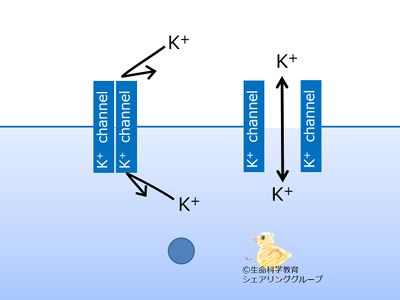「Cell/membrane/membrane transport/membrane transport protein/channels/open, close」の版間の差分
ナビゲーションに移動
検索に移動
編集の要約なし |
編集の要約なし |
||
| 9行目: | 9行目: | ||
//LEVEL:3 | //LEVEL:3 | ||
//RAND | //RAND | ||
Sodium (Na<sup>+</sup>) can pass through the sodium (Na<sup>+</sup>) channel when the channel is {=open | Sodium (Na<sup>+</sup>) can pass through the sodium (Na<sup>+</sup>) channel when the channel is {=open~closed}. | ||
//LEVEL:3 | //LEVEL:3 | ||
//RAND | //RAND | ||
Potassium (K<sup>+</sup>) can pass through the potassium (K<sup>+</sup>) channel when the channel is {=open | Potassium (K<sup>+</sup>) can pass through the potassium (K<sup>+</sup>) channel when the channel is {=open~closed}. | ||
</GIFT> | </GIFT> | ||
2014年11月18日 (火) 22:15時点における版
POINT!
| The channels open and close. |
video: Flash(Win, Mac) / MP4(iPad)
When the potassium channel is open. potassium ions CAN pass through, but, when the channel is closed, the ions can NOT pass through.
Challenge Quiz
1.
Sodium (Na+) can pass through the sodium (Na+) channel when the channel is open closed .
2.
Potassium (K+) can pass through the potassium (K+) channel when the channel is open closed .

